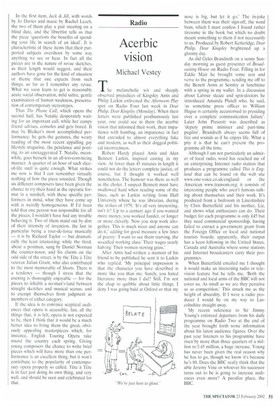Six-Pack (Bridewell Theatre)
Handful of fun
Michael Tanner
Tetc a Tete is a small company, founded in 1997, for bringing 'uplifting, surprising, daring and intimate opera productions of the highest quality to the widest possible audiences', according to the programme book of its latest venture, six very brief operas jointly called Six-Pack. It is playing at the Bridewell Theatre, ten performances, until 9 March, and then touring, and is very well worth going to, despite any reservations I might have about the enterprise or some of its presuppositions. Tete a Tete staged a very similar event at the Battersea Arts Centre in 1997, called Shorts, which was also highly enjoyable, so much so that the ENO Studio decided to join forces with them and continue in the same vein. The publicity bristles with anti-elitism, stressing that 'more or less every single piece turns the spotlight on very real, very ordinary people', and that 'opera no longer has to be about young beautiful thwarted lovers or ethereal beings with fancy names': the idea is to 'prove to you that an evening of contemporary opera can make a great night out at the theatre'. Whether it will prepare you for much other contemporary or non-contemporary opera is a question, but meanwhile it's worth looking a bit closer at what Tete a Tete has achieved on this occasion.
There are four singers, one of them a counter-tenor; and four instrumentalists, playing wind, accordion, double bass and percussion; a conductor. The stage has an open-reel tape deck which plays between items, a spoken introduction-cum-commentary, funny and more effective than the musical 'glue' which was employed for Shorts. The performers are almost all professionals, and they are quite remarkably able, both individually and as a team. One of them, the bass-baritone D'Arcy Bleiker, is clearly destined for stardom, with a rich and powerful voice, a striking appearance and exceptional histrionic gifts. He plays in all six pieces, and is tireless and astonishingly versatile. Sitting in the front row I found his voice unremittingly strong, and I can't believe that the Bridewell Theatre demands such volume; in all other respects he is ideal. The one female singer, Natalie Raybould, is still at the RAM, and at the moment her acting powers are more impressive than her singing, but that was still adequate.
In the first item, Jack & Jill, with words by Jo Davies and music by Rachel Leach, the two of them play a pair meeting on a blind date, and the librettist tells us that the piece 'questions the benefits of spending your life in search of an ideal'. It is characteristic of these items that their purported subjects overshoot by some way anything we see or hear. In fact all the pieces are in the nature of revue sketches, as their length would suggest, and their authors have gone for the kind of situation or theme that one expects from such things, so far as I remember any revue, What we soon learn to get is reasonably acute social observation, mild satire, gentle examination of human weakness, presentation of contemporary stereotypes.
Thus The Phone Call, which opens the second half, has Natalie desperately waiting for an important call, while her campy friend advises, consoles and gets bored. It may be Bleiker's most accomplished performance: he gets the gestures, the weary reading of the most recent appalling gay lifestyle magazine, the petulance and pouting, to an unexaggerated T. Natalie, meanwhile, goes berserk in an all-too-convincing manner. A quarter of an hour of such sliceof-life stuff is quite enough. What strikes me now is that I can remember virtually nothing of how the piece sounded. Though six different composers have been given the chance to try their hand at the operatic format in a nutshell, with these specific performers in mind, what they have come up with is weirdly homogeneous. If I'd been told that one person was responsible for all the pieces, I wouldn't have had any trouble believing it. Two of them stand out by dint of their intensity of invention, the last in particular being a tour-de-force musically — it is by Richard Taylor — but dramatically the least interesting: while the third, about a postman, sung by Daniel Norman the counter-tenor, and his clients on the odd side of the street, is by the Tete a Tete veteran Julian Grant, who also contributed to the most memorable of Shorts. There is a tendency — though I stress that the evening is thoroughly enjoyable — for the pieces to inhabit a no-man's-land between straight sketches and musical scenas, and to exempt themselves from judgment as members of either category.
If the idea is to convince sceptical audiences that opera is accessible, fun, all the things that, it is felt, opera is not expected to be, then I think that it would be a much better idea to bring them the great, obviously appealing masterpieces which, for instance, English Touring Opera take round the country each spring. Giving young composers the chance to write brief pieces which will have more than one performance is an excellent thing, but it won't contribute to the popularity of contemporary opera properly so called. Tete a. Tete is in fact just doing its own thing, and very well, and should be seen and celebrated for that.







































































 Previous page
Previous page